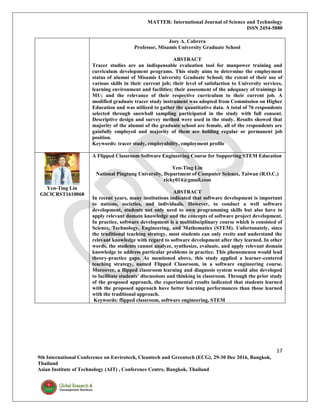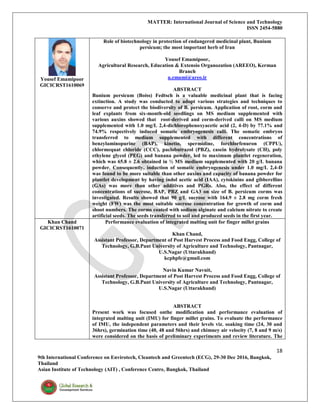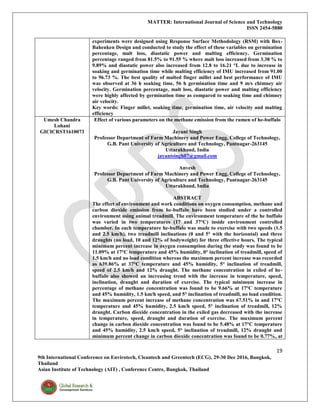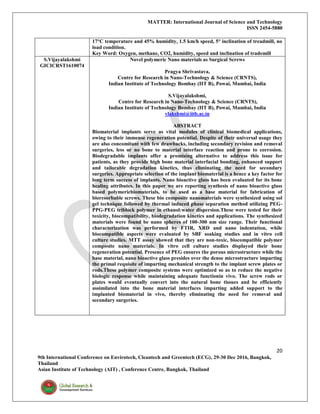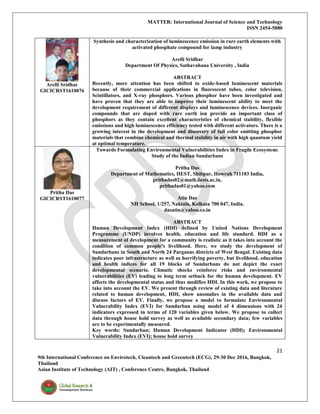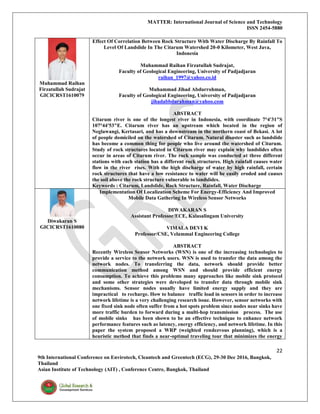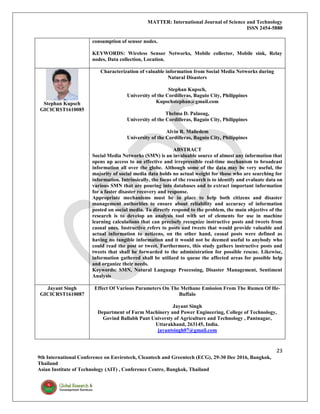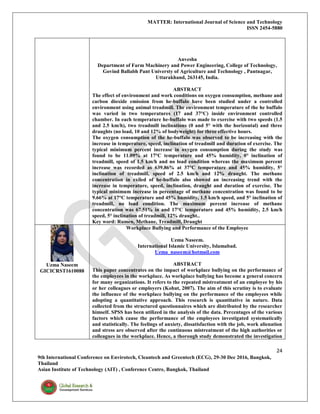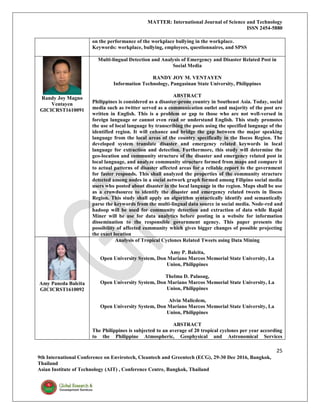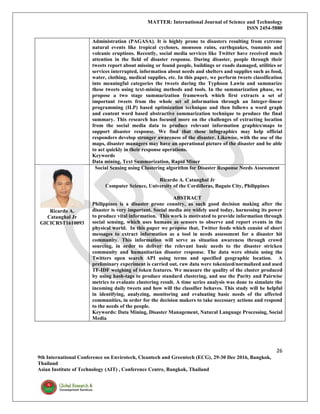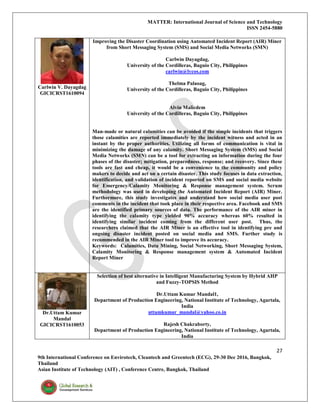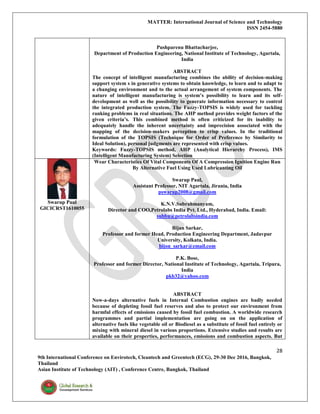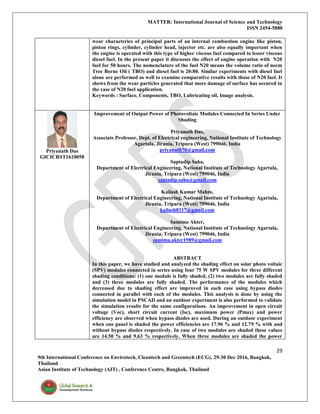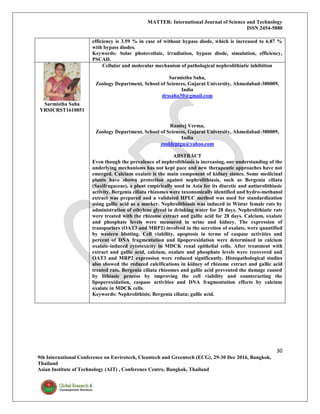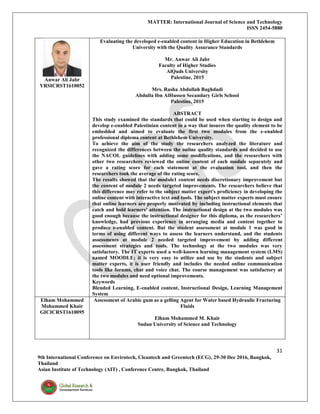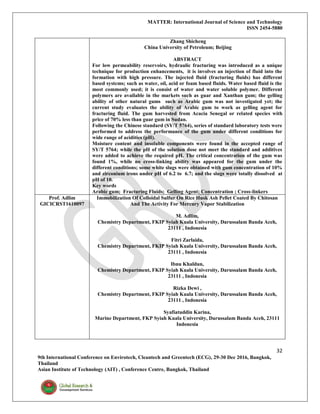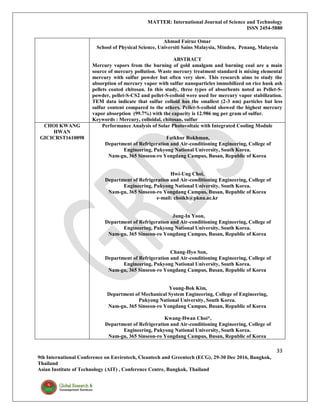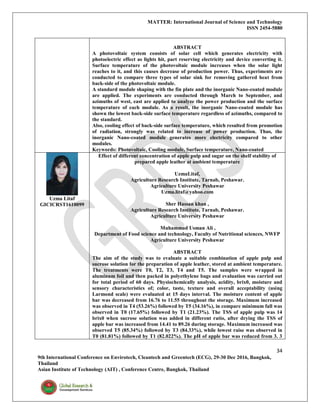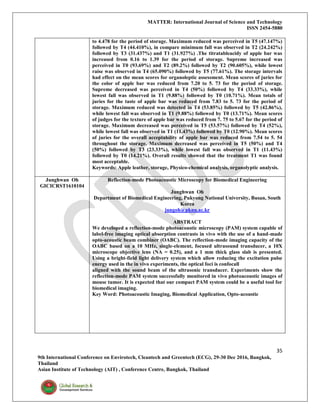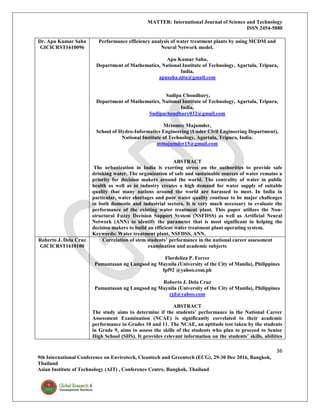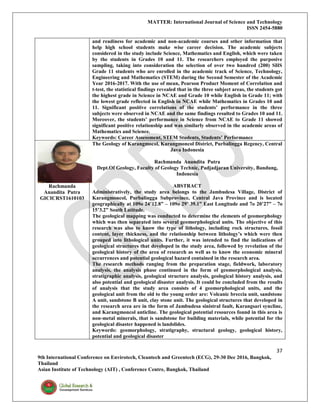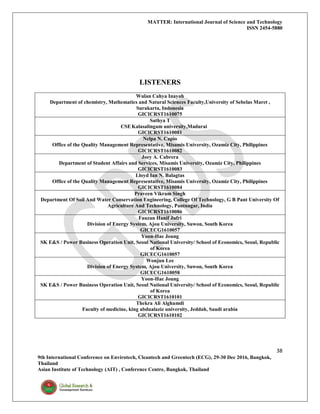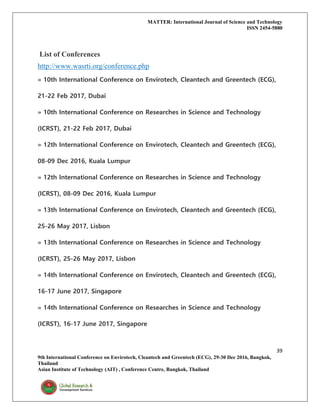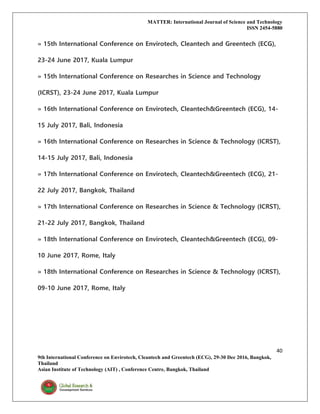The document outlines the proceedings of the 9th International Conference on Envirotech, Cleantech, and Greentech held in Bangkok, Thailand, from December 29-30, 2016. It covers various research papers addressing topics such as ethnomedicine, unconventional gas production, wastewater treatment using hybrid napier grass, enzymatic biotransformation of stevioside, and genetic analysis for drought tolerance in wheat. Additionally, it highlights the integration of religious faith and indigenous knowledge for sustainable development and environmental management.
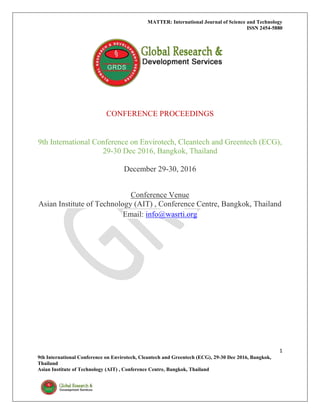
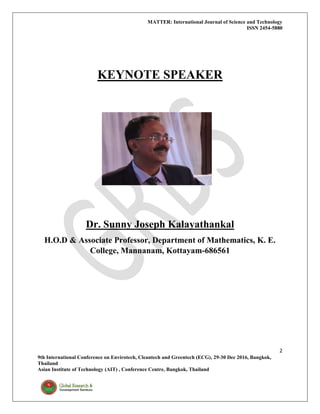
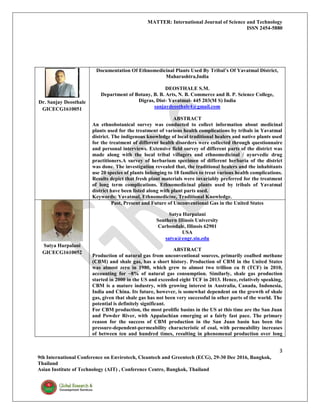
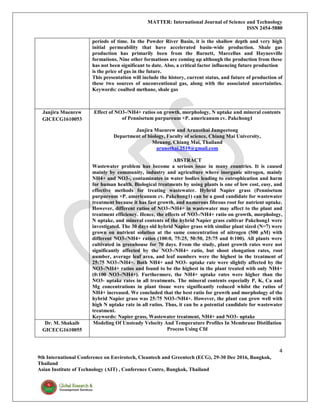
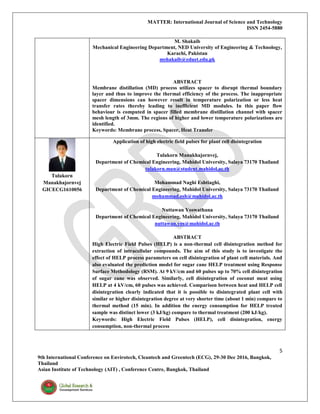
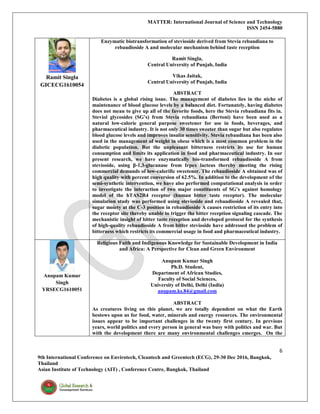
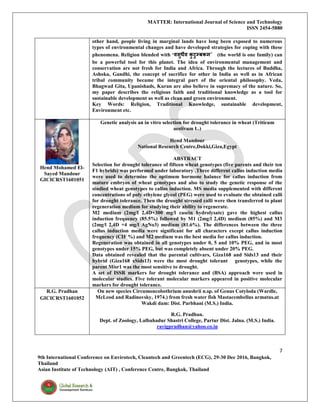
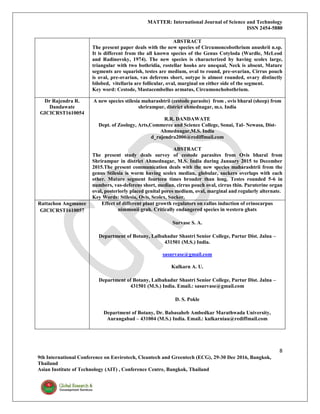
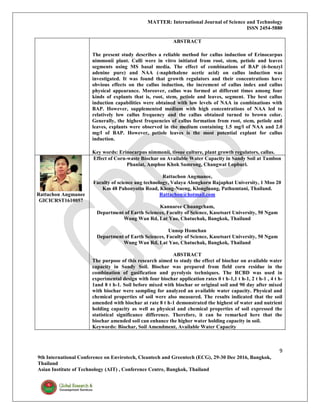
![MATTER: International Journal of Science and Technology
ISSN 2454-5880
10
9th International Conference on Envirotech, Cleantech and Greentech (ECG), 29-30 Dec 2016, Bangkok,
Thailand
Asian Institute of Technology (AIT) , Conference Centre, Bangkok, Thailand
Paritosh
Bhattacharya
GICICRST1610059
Differential-Transeform-Method For Solving Lotka -Volterra Equations By Using
Holling Type Iii Functional Response
Paritosh Bhattacharya
Associate Professor
Mathematics Department
NIT Agartala, Tripura, India
Anirudhya Roy
Research Scholar
Mathematics Department
NIT Agartala, Tripura, India
Susmita Paul
Research scholar
Mathematics Department
NIT Agartala, Tripura, India
ABSTRACT
In this paper, the Differential-Transform-Method (DTM) is applied for solving one-
species Lotka-Volterra model and its modified form by introducing Holling type III
functional response. Comparison with the Laplace Adomian Decomposition Method
(LADM) to shows that the Differential-Transform-Method (DTM) is a most powerful
numerical technique for nonlinear differential equations. We try to find the
difference between the exact solution and numerical solutions.
Keywords: Laplace Adomian Decomposition Method, Differential-Transform-
Method, Lotka-Volterra model, Holling Type III Functional Response.
Minal Saxena
GICICRST1610060
Channel Estimation Techniques for 5G Technology
Minal Saxena
VLSI Design, Maulana Azad National Institute of Technology, Bhopal, India
ABSTRACT
A new mobile generation has appeared approximately every 10 years since the first
1G system, Nordic Mobile Telephone, was introduced in 1981. The first 2G system
was commercially deployed in 1992, and the first 3G system appeared in 2001. 4G
systems fully compliant with IMT Advanced were first standardized in 2012. The
development of the 2G (GSM) and 3G(IMT-2000 and UMTS) standards took about
10 years from the official start of the R&D projects, and development of 4Gsystems
began in 2001 or 2002.[3][4] Predecessor technologies have been present on the
market a few years before the new mobile generation, for example the pre-3G system
CdmaOne/IS95 in the US in 1995, and the pre-4G systems Mobile WiMAX in South-
Korea 2006, and first release-LTE in Scandinavia 2009. In April 2008, NASA
partnered with Machine-to-Machine Intelligence (M2Mi) Corp to develop 5G
communications technology.
5G Technology and its features
New mobile generations are typically assigned new frequency bands and wider
spectral bandwidth per frequency channel (1G up to 30 kHz, 2G up to 200 kHz, 3G](https://image.slidesharecdn.com/ecgproceedings-170408053135/85/Ecg-proceedings-10-320.jpg)
![MATTER: International Journal of Science and Technology
ISSN 2454-5880
11
9th International Conference on Envirotech, Cleantech and Greentech (ECG), 29-30 Dec 2016, Bangkok,
Thailand
Asian Institute of Technology (AIT) , Conference Centre, Bangkok, Thailand
up to 20 MHz, and 4G up to 100 MHz). There is still room for larger channel
bandwidths and new frequency bands suitable for land-mobile radio. From users'
point of view, previous mobile generations have implied substantial increase in peak
bitrate (i.e. physical layer net bitrates for short-distance communication), up to 1
Gbit/s to be offered by 4G. 4G offers download speeds that are roughly equivalent to
your superfast broadband (around 30-40Mbps) at homes but 5G will go well beyond
that. One of the chief complaints with 4G is that it offers a new level of speed, but
sticks its users with the same old data restrictions. It's estimated 5G technology will
offer upwards of 1,000 times the capacity of 4G. This means that there'll be more
space for everyone to access this advanced network, which should negate the need for
mobile operators to throttle or limit your access to their networks.
That being said, various entities working on potential 5G network standards,
including Samsung and researchers at New York University, has come up with the
idea of utilizing millimeter-wave frequencies. This frequency range lies between 3 to
300MHz, which is much higher than current network standards. The main
advantage of using this frequency range is that it's scarcely used by other broadcast
technologies.
5G technology offer high resolution for crazy cell phone user and bi-
directional large bandwidth shaping.
5G technology also providing subscriber supervision tools for fast action.
5G technology is providing large broadcasting of data in Gigabit which
supporting almost 65,000 connections.
5G technology offer transporter class gateway with unparalleled consistency.
The traffic statistics by 5G technology makes it more accurate.
Through remote management offered by 5G technology a user can get better
and fast solution.
The 5G technology is providing up to 25 Mbps connectivity speed.
The uploading and downloading speed of 5G technology touching the peak.
Orthogonal Frequency Division Multiplexing
Orthogonal Frequency Division Multiplexing (OFDM) is a multicarrier transmission
technique, many carriers, each one being modulated by a low rate data stream share
the transmission bandwidth. Orthogonality is a property that allows multiple
information signals to be transmitted perfectly over a common channel and detected
without interference. However, OFDM uses the spectrum much more efficiently by
spacing the channels much closer therefore thi scheme is recommended for 5G and
HSOPA Communication. The OFDM is a digital modulation scheme that can
support high-speed video communication along with audio with elimination of
Intersymbol Interference (ISI) and Interchannel Interference (ICI) [2002, M. Luise,
M. Marselli, and R. Reggiannini, IEEE]. At the same time, it can accommodate more
number of users showing the spectral efficiency. Because of high capacity
transmission of OFDM ,It has been applied to Digital transmission system, such as
Digital audio broadcasting(DAB) system ,Digital video broadcasting TV(DVB-
T)system, Asymmetric digital subscriber line(ADSL),Ultra wideband(UWB) system,
IEEE 802.11a/g Wireless local area network(WLAN),IEEE 802.16 Worldwide
interoperability for microwave access (WiMax)systems and HIPERLAN2(High
performance local area network).Its application in mobile communication is more
complex especially because of the mobility of the mobile user, thus more exact
symbol and frequency offset control must be used to ensure that the subcarrier
remain orthogonal. During the transmission the signal suffers due to the fading
environment and hence results in two major problems. One problem is the unknown](https://image.slidesharecdn.com/ecgproceedings-170408053135/85/Ecg-proceedings-11-320.jpg)
![MATTER: International Journal of Science and Technology
ISSN 2454-5880
12
9th International Conference on Envirotech, Cleantech and Greentech (ECG), 29-30 Dec 2016, Bangkok,
Thailand
Asian Institute of Technology (AIT) , Conference Centre, Bangkok, Thailand
time instant to start sampling a new OFDM symbol, known as Timing Offset. A
second problem is the mismatch of the oscillator frequencies between the transmitter
and receiver resulting in frequency offset. The demodulation of a signal with an
offset in the carrier frequency can cause large bit errors and may degrade the
performance of a symbol synchronizer [2005, OFDM Transceiver Reference Design”,
Lattice Semiconductor OFDM Transceiver design package]. Also, Sensitivity to a
timing offset is higher in multi-carrier systems than in single-carrier systems .It is
therefore important to estimate this offset and minimize its impact. Frequency offset
is estimated at the instant the start of the frame is detected, therefore its value is
directly related to timing offset.
Radhika Chelamalla
GICICRST1610061
Molecular docking studies and ADMET predictions of pyrimidine coumarin
scaffolds as potential IDO inhibitors
Radhika Chelamalla
Ajitha Makula
Centre for Pharmaceutical Sciences, Jawaharlal Nehru Technological University,
Kukatpally, Hyderabad-500085, TS, India
cradhika8@gmail.com
ABSTRACT
Indoleamine 2,3-dioxygenase (IDO) is emerging as an important new therapeutic
drug target for the treatment of cancer. IDO catalyzes the rate-limiting step of
tryptophan degradation throughkynurenine pathway. Reduction in local tryptophan
concentration and the production of immunomodulatory tryptophan metabolites
contribute to the immunosuppressive effects of IDO. Presence of IDO on dendritic
cells in tumor-draining lymph nodes leading to the activation of T cells results in
formation of immunosuppressive microenvironment for thesurvival of tumor cells,
shows the importance of IDO as a novel anticancer immunotherapy drug target.
Pyrimidine has the unique ability to act through many different mechanisms and its
multiple biological activities make it an ideal therapeuticagent in treating cancer.In
this effort directed towards the discovery of novel, potent IDO inhibitors for the
treatment of cancer. In the present study a library of pyrimidine derivatives has been
designed and evaluated for their anti-cancer activity targeting IDO using various
computational approaches. Twenty new pyrimidine series of compounds were
designed and docking studies were performed. All of them have found to be
successfully docked inside the active binding domain of IDO with a binding energy in
a range of -4.59 to -9.53 Kcal/mol with predicted IC50 value range of 4.72 micro
molar to 456.19 nano molar. On the other hand, calculated 2DQSAR molecular
descriptor properties of the compounds showed promising ADME parameters and
found to be in compliance with Lipinski’s rule of five. Among all the twenty
compounds tested, compound 14 (N'-(6-chloro-2-oxo-chromene-3-carbonyl)-4-(4-
methoxyphenyl)-6-methyl-2-thioxo-3,4-dihydro-1H-pyrimidine-5-carbohydrazide)
was found to be the best lead like molecule with a binding energy of -9.53 kcal/mol.
Conclusively, newly designed compound 14 of the present study have shown
promising anti-cancer potential worth considering for further evaluations.
Keywords: IDO domain, pyrimidine, coumarin, docking, ADME, QSAR, anti-
cancer.](https://image.slidesharecdn.com/ecgproceedings-170408053135/85/Ecg-proceedings-12-320.jpg)
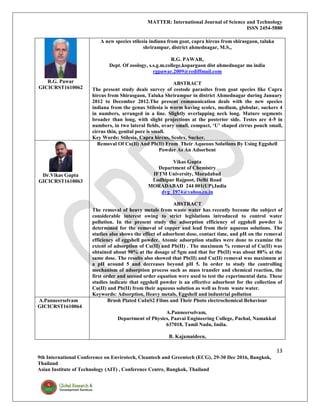
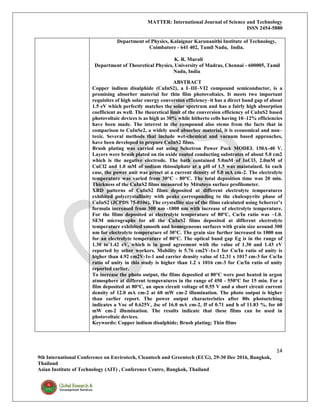
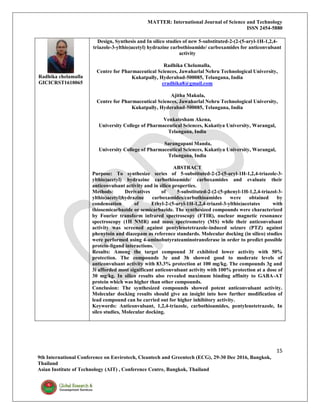
![MATTER: International Journal of Science and Technology
ISSN 2454-5880
16
9th International Conference on Envirotech, Cleantech and Greentech (ECG), 29-30 Dec 2016, Bangkok,
Thailand
Asian Institute of Technology (AIT) , Conference Centre, Bangkok, Thailand
Dr. Popat B Mohite
GICICRST1610066
Design and Characterization of Hydrogel based Nanocrystals of Rosuvastatin for
Solubility and Dissolution Enhancement
Dr. Popat B Mohite,
Department of Pharmaceutical Chemistry, Mula Education Society’s College Of
Pharmacy Sonai
Tal –Newasa Dist- Ahmednagar, Maharashtra-414105, India
Dr. Ramdas B Pandhare
Department of Pharmaceutical Chemistry, Mula Education Society’s College Of
Pharmacy Sonai
Tal –Newasa Dist- Ahmednagar, Maharashtra-414105, India
ABSTRACT
Objective: In this study, an attempt was made to improve the solubility and
dissolution characteristics of poorly soluble drug Rosuvastatin.
Methods: The nanosuspensions of Rosuvastatin were prepared using precipitation–
Ultra sonication method followed by its lyophilization using mannitol as a
cryoprotectant. Nanoparticles characterized in terms of size and morphological
characteristics. Characterization of the prepared nanosuspension was done with
respect to particle size, zeta potential, saturation solubility, dissolution rate,
morphology study [SEM], in vitro dissolution study.
Results: The results indicated that the initial crystalline state of the drug reduced the
following: particle size reduction and the dissolution rates of Rosuvastatin
nanoparticles were highly increased with comparison to pure drug by the
enhancement of intrinsic dissolution rate and reduction of particle size resulting in a
increased specific surface area.
Conclusion: Nanoparticles are seemed to promising approach for bioavailability
enhancement because of the simple method of its preparation and its universal
applicability.
Keywords: Nanosuspension, Rosuvastatin, Bioavailability enhancement.
Vincent
GilbolinggoCataraja
GICICRST1610067
Tracer Study of Misamis University Graduate School Alumni
Vincent G. Cataraja
Student, Master of Arts in Education
Graduate School, Misamis University
Lloyd Ian N. Balagtas
Student, Master of Arts in Education
Graduate School, Misamis University
Lady Shammah G. Engracia
Student, Master of Arts in Education
Graduate School, Misamis University
Nelpa N. Capio
Professor, Misamis University Graduate School](https://image.slidesharecdn.com/ecgproceedings-170408053135/85/Ecg-proceedings-16-320.jpg)
